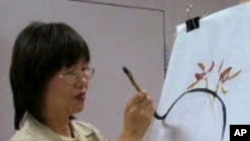For many people, a cancer diagnosis can be as devastating as the disease itself, and many patients struggle to be upbeat as they face debilitating treatment and, sometimes, the prospect of death. M.D. Anderson Cancer Center in Houston, a top cancer hospital, has found a way of helping patients remain optimistic through art classes taught by professional artists. Focusing on creativity helps many patients forget about their cancer, if only for a few hours.
Mary Jane Willard is a breast cancer survivor. She has a new lease on life and a new way of expressing herself.
She's learning Chinese ink art through M.D. Anderson's COLLAGE program, also known as the Art for Cancer Network.
"It relaxes you, it relaxes me," she said. "I have learned a lot of different things with the art, Chinese ink art, and I have made a lot of friends."
The class is taught by Peihong Dong Endris, an artist who learned the technique growing up in China.
Endris says the class helps patients forget about their daily struggle with disease and find comfort in their creativity.
"I think from this class, even if for some people it is difficult at times, they can get some short time peace," she said.
The students say they love this art form and their teacher.
"She is very good. She helps you go step by step and with each person she demonstrates, too, she gives you that opportunity," she added.
George Spaulding, a New Orleans native fighting lung and bone cancer, says these classes keep him from feeling confined.
"It gets me out from the room we are staying in and gets my mind more active," he said. "I enjoy art and so this is a different kind of art I am trying to learn."
Although there are other art therapy programs, this one focuses on the art, rather than the therapy.
Having professional artists teach these classes was the idea of Doctor Jennifer Wheler. She established COLLAGE three years ago.
"Whereas art therapy has a specifically therapeutic intent, the COLLAGE is really all about having fun," she said.
Studies have shown that improvements in mood and outlook can help a patient fight disease. And although no scientific studies have been carried out on this program, Dr. Wheler says she thinks it helps.
"It can't hurt, it can only help, and scientists are trying to be a little more rigorous about quantifying the effect," she added.
Some patients hope to emulate Endris in assembling a portfolio they can eventually show to friends.
Since the COLLAGE program started in 2006, more than 1,000 people have participated and several artists are on staff as instructors.






